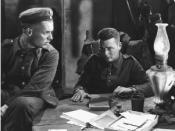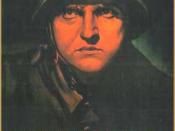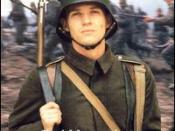Robin Pennington Eng 102 Prof. Kehl "ALL QUIET ON THE WESTERN FRONT" 11 March 2014 "ALL QUIET ON THE WESTERN FRONT" In chapter one of "All Quiet on the Western Front", the novels main themes are presented: the horror of war and its effect on the ordinary soldier. Paul and his classmates were persuaded to volunteer by their high school teacher, Kantorek. They went through basic training, which they hated, under the despicable Sergeant Himmelstoss. Many of Paul's classmates die or are injured shortly after reaching the front, notably Franz Kemmerich. For Paul and his classmates, the army has become an expression of patriotic duty instead of a career. Outside the classroom, young men of their age faced ostracism and condemnation from society, if they did not join the war effort as volunteers. The second chapter focuses on Paul's inner state, exploring the toll taken by the war on the humanity of an individual soldier.
As a young student, he used to write poetry. Now, he feels empty and cynical, thinking that his short time as a soldier has taught him more hard lessons about life than a decade at school could. He has no interest in, or time for, poetry, and his parents now seem to him a hazy and unreliable memory. He feels that "only facts are real and important to us." Paul ruminates that he and the other young men of his generation were cut off from life just as they had begun to live it. The older soldiers have jobs and families to which they can return after the war, but the younger men have nothing; the war has become their entire lives. Whereas the older men will forget the trenches and the death, the young men have nothing definite on...


